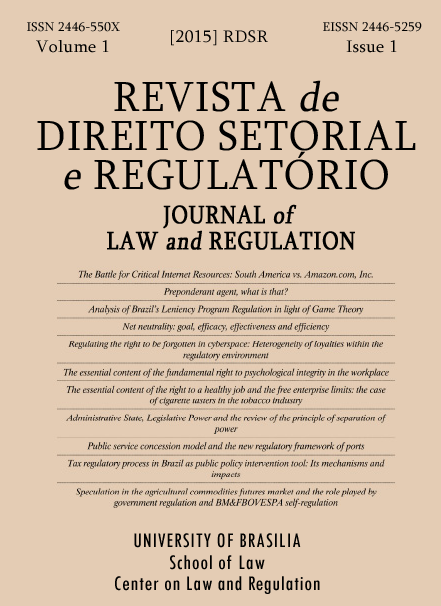Net neutrality: goal, efficacy, effectiveness and efficiency
Keywords:
net neutrality, efficacy, effectiveness, efficiency, public interestAbstract
Purpose ”“ This article aims to address the role of net neutrality on the Internet network structure’s scarcity.
Methodology/approach/design ”“ It analyses cases of Internet service’s success and failure to illustrate a few points of what is claimed by net neutrality advocates. In addition, it draws a parallel of the difficulties faced by content providers, but not by network providers, and how strategies of the latter can simultaneously violate the net neutrality, harm the former and cause negative impact on their strategies, and harm users. Concerning this issue, this study makes a comparison of the current regulatory environment in Brazil and in the United States and uses convergence and intersection between Game Theory, transaction costs of Coase Theorem, Public Interest Theory and the design of an efficient and equitable regulatory system to analyze the purpose of the players.
Findings ”“ This article suggests parameters of goal, efficacy, effectiveness and efficiency as means to prevent violations of net neutrality in issues involving internet users.
Practical implications ”“ It helps evaluate relationships that have the potential to violate the principle of net neutrality.
Downloads
References
BENOÎT, J. P., & Kornhauser, L. A. (2002). Chapter 60 Game-theoretic analysis of legal rules and institutions. Handbook of Game Theory with Economic Applications.
COASE, R. H. (1960). The Problem of Social Cost. The Journal of Law and Economics.
DAWKINS, R., & Florshein, G. H. M. (1979). O gene egoísta. (A. B. Cunha, Ed.)O Homem e a Ciência (p. 230). Editora Itatiaia/EDUSP.
FEINTUCK, M. (2010). Regulatory Rationales Beyond the Economic: In Search of the Public Interest. The Oxford Handbook of Regulation, (September), 1”“17. doi:10.1093/oxfordhb/9780199560219.003.0003
GREIF, A. (2002). Chapter 52 Economic history and game theory. Handbook of Game Theory with Economic Applications.
ISENBERG, D. (1998). The dawn of the “stupid network.” NetWorker, (March 1998), 1”“7. Retrieved from https://fenix.tecnico.ulisboa.pt/downloadFile/3779571637666/The Dawn of the Stupid Network.pdf
MARSDEN, C. T. (2010). Towards a Co-regulatory Solution. Bloomsbury Publishing, 35. Retrieved from http://ssrn.com/abstract=1533428
NASH, J. (1951). Non-Cooperative Games. Annals of Mathematics, 54, 286”“295. Retrieved from http://www.jstor.org/stable/1969529
NEVES, V. (2011). « Custos sociais: Onde para o mercado? ». Revista Crítica de Ciências Sociais [Online], 95, 55”“68. Retrieved from http://rccs.revues.org/4368
OSTROM, E. (2000). Collective action and the evolution of social norms. The Journal of Economic Perspectives, 14(3), 137”“158. Retrieved from http://www.jstor.org/stable/2646923
SANO, H., & Filho, M. M. (2013). As técnicas de avaliação da eficiência, eficácia e efetividade na gestão pública e sua relevância para o desenvolvimento social e das ações públicas. Desenvolvimento Em …. Retrieved from https://www.revistas.unijui.edu.br/index.php/desenvolvimentoemquestao/article/view/186
SMITH, J. M., & PRICE, G. R. (1973). The Logic of Animal Conflict. Nature, 246(5427), 15”“18. Retrieved from http://dx.doi.org/10.1038/246015a0
STIGLITZ, J. (2009). Government failure vs. market failure: Principles of regulation. In D. A. Balleisen, Edward J.; Moss (Ed.), Government and Markets: Toward a New Theory of Regulation. (Vol. m, pp. 13”“51). Cambridge: Cambridge University Press. Retrieved from http://academiccommons.columbia.edu/download/fedora_content/download/ac:126998/CONTENT/JES.Govt.Failure.Mkt.Failure.pdf
VON NEUMANN, J., & Morgenstern, O. (1944). Theory of Games and Economic Behavior. Princeton University Press (Vol. 2, p. 625). doi:10.1177/1468795X06065810
WU, T. (2003). Network neutrality, broadband discrimination. J. on Telecomm. & High Tech. L., 925(2001), 77”“90. Retrieved from http://heinonlinebackup.com/hol-cgi-bin/get_pdf.cgi?handle=hein.journals/jtelhtel2§ion=9
Downloads
Published
How to Cite
Issue
Section
License
By submitting this paper to the Journal of Law and Regulation, I hereby declare that I agree to the terms of the Creative Commons Attribution 4.0 International (CC BY 4.0), available at http://creativecommons.org/licenses/by/4.0.


